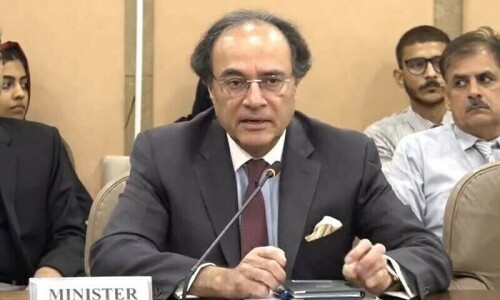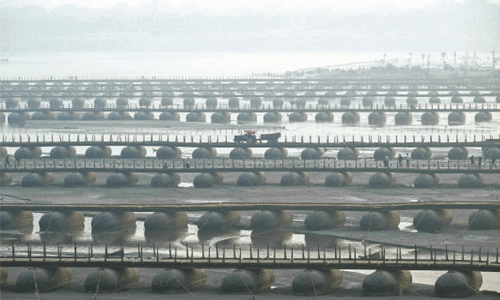Finance Minister Muhammad Aurangzeb announced on Sunday that the government has returned approximately Rs68 billion in tax refunds since the process began on July 1.
Addressing a press conference in Islamabad, the finance minister said that if the government wants to expand the tax net and take it to 13 per cent, then it also has to focus on the deliverables, stating, “It takes two to tango,” meaning that cooperation is required from the government, citizens, and industrial sectors to achieve the goals.
According to the Federal Board of Revenue (FBR), taxpayers can reclaim excess taxes paid to the FBR if their tax liability is lower than the amount they have paid. The process involves filing an electronic tax return, followed by an application through the FBR’s Iris system. Refunds must be claimed within two years from the date of filing or payment as late filings may affect eligibility.
“The determined sales tax, […] income tax refunds, and duty drawbacks are being processed from July 1 to resolve the issue of delayed returns, which previously took six to ten months,” the finance minister said.
“To date, according to the figures I have, the government has refunded Rs68 billion”.
Aurangzeb emphasised the importance of issuing tax refunds promptly, drawing from his experience in the private sector. He said that timely refunds were crucial for the industry as they directly enhanced liquidity, allowing businesses to operate more effectively and invest in growth.
“If they don’t get this liquidity back, they have to go ahead with working capital because the interest rate regime is the big drawdown,” he added.
The minister went on to thank the traders who were registering under the Tajir Dost Scheme, stating that it was necessary to increase the tax net.
“People question that if I empathise with the salaried class, what have I done for them? [And I explain that] four to five months ago, I was part of that class and my tax returns and my overall income are openly available — because under the law of the land it [ the returns of public officials] has to be published, and I was one of the highest taxpayers in the country”.
Aurangzeb said that this initiative was a positive step forward, acknowledging that there was no magic wand, so changes won’t happen overnight. However, he emphasised that failing to start moving in the right direction now would result in significant problems down the line.
He also addressed the scepticism faced by the government, noting that the International Monetary Fund (IMF) shared the same doubt due to its desire for “certainty and ease of collection”.
“So, until we can bring the untaxed and the undertaxed sectors back into the net, we will keep on going back to the same situation,” he stated.
Regarding the new reforms of the FBR, the finance minister stated that Prime Minister Shehbaz Sharif was personally overseeing meetings every two to three weeks, adding that digitalisation was bringing certain things into perspective.
He stated that there were 4.9 million tax filers on the income tax side and that their tax data was already available through various channels, including the National Database and Registration Authority (NADRA).
Aurangzeb said that when the data ended up with field formations first, it resulted in issues of trust, that they could use the data to “make deals” which resulted in “harassment and corruption”, adding that it will not happen anymore.
“Because of data analytics, it will also confirm the veracity of the data,” he stated, “Neither one of us can blame each other then.” He added that the field formation’s only job would be to collect the money already known to both parties.
On the sales tax side, the minister said around Rs600 billion in fake taxes were created and identified, however, only Rs1 billion had been recovered. He further revealed that in terms of customs taxes, there was a deficit worth 50 to 200 billion due to misclassification and under-invoicing.
“My only request is that that you should raise your voice about this — in terms of people who are going to be taxed or who are paying tax or are over-taxed,” he said.
“You should raise your voice along with me so that these untaxed and undertaxed sectors start paying and start doing the right thing in terms of their contribution to the economy of this country.”
The minister also discussed the need to simplify the tax system, saying that under the Tajir Dost Scheme, merchants will register through a mobile app and fill out an application, eliminating the need to interact directly with FBR personnel.
“For the past six years, I also flip-flop whether I work for the government or the private sector,” he joked. “But I will openly talk about this because we need to do what we need to ensure the simplification of the processes”.
Govt introduces new tax measures to meet IMF criteria
Last month, the government extended exemptions in specific sectors while announcing new tax measures in several areas to generate additional revenue in the coming fiscal year to meet the International Monetary Fund’s criteria.
These measures, according to the amended Finance Bill 2024, included the introduction of a capital value tax (CVT) on properties in Islamabad and new taxes on builders and developers, a reduction in the Petroleum Development Levy (PDL) on diesel and petrol from Rs80 to Rs70 per liter.
The Federal Excise Duty (FED) on air tickets saw significant increases, with economy and economy-plus foreign travel tickets now taxed at Rs12,500, a 150% increase. Different FED rates apply for various classes and regions, such as Rs350,000 for tickets to North and South America, Rs150,000 for the Middle East and Africa, and Rs210,000 for Europe and the Far East.
Exporters are not required to pay the standard corporate tax rate of 29%, a shift from the previous 1% tax on export turnover. Additionally, individuals and associations earning over Rs10 million annually will face a 10% surcharge on their income tax.
The government extended reduced tax rates for hybrid vehicles until June 2026, increased the FED on cement from Rs3 to Rs4 per kg, and continued sales tax benefits for certain regions for another year.
Other measures include broadening the exemption for the sale or transfer of immovable property to include various government and military personnel.
The dividend withholding tax rate was reduced to 15% from 20%, and a 25% rebate for teachers and researchers was restored.
Sales tax exemptions were reinstated for newsprint, books, certain medical equipment, and supplies to charitable hospitals.
The government also placed the import of gold under the entrustment scheme and exempted imports of specific medicines and bovine semen from sales tax. Corporate dairy farms will face an 18% sales tax on milk, and an FED of 5% ad valorem will be applied to lubricating oil.
The minimum price for selling cigarettes at retail saw a reduced FED from 60% to 55%. Furthermore, the CVT on farmhouses and residential homes in Islamabad has been specified, with rates varying based on property size.
















































Dear visitor, the comments section is undergoing an overhaul and will return soon.